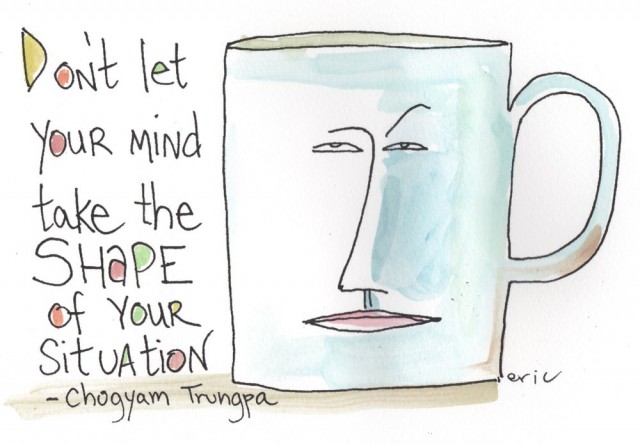 When you pour tea into a tall, thin cup, the tea assumes that tall, thin shape. When you pour tea into a squat, round cup, it assumes that shape.
When you pour tea into a tall, thin cup, the tea assumes that tall, thin shape. When you pour tea into a squat, round cup, it assumes that shape.
It’s wonderful that tea does this. It facilitates tea drinking. But your mind needn’t act like tea. Too often it does.
How does the mind act like tea?
Just as tea takes the shape of whatever container it’s poured into, the mind tends to assume the shape of whatever thought, emotion or sensation captures its attention. But it doesn’t just assume the shape of what is arising; it identifies with the object of attention.
The mind believes it is what it is aware of.
When the emotion of sadness arises, the mind identifies with that emotion and believes it is sadness. Not, “I’m aware of sadness,” but “I am sad.”
When anger is present, the mind believes, “I am angry.”
The mind identifies with whatever condition is most intense at a moment in time.
Whether it’s an inner condition like a thought or emotion, or an outer condition like hitting a hole-in-one or gaining three pounds, the mind tends to lose itself and identify with whatever it’s aware of.
There’s nothing wrong with being aware of what is arising.
It’s important to be aware of our inner and outer world. Spiritually and practically.
But here’s the rub: When our mind is immersed in identification, it’s no longer aware. When our mind is believing “I’m sad,” it’s no longer aware of sadness.
To become aware, the mind needs to step back.
To dis-identify with what is arising in order to be fully aware. This state of non-identified and fully engaged awareness is called witness consciousness.
It’s quite different from tea-like mind. Witnessing consciousness allows the mind to fully experience what arises without being overcome by identification. It’s a paradoxical state of mind.
It’s neither lost in identification nor separate from experience.
The witnessing consciousness simultaneously transcends the object of attention while fully entering into it.
It’s this paradoxical quality—of being beyond and fully engaged—that makes witness consciousness such a powerful source of healing.
Witness consciousness is able to infuse all conditions with the light of awareness.
Through the function of witness consciousness, the light of awareness can fully infuse any and every condition. The mind is thus able to engage with all forms of conditions as a healing presence.
It is able to investigate, enter and experience any condition fully—because of this engaged detachment. Witness consciousness develops as the mind dis-identifies with conditions while remaining fully present.
How can we access witness consciousness?
The most reliable way is through meditation practice. Meditation practice is ideally—and intentionally—designed to cultivate witness consciousness.
This happens organically as we practice.
When we begin meditating (whenever we sit down), we become aware of how easily the mind slips away into identification with thought, emotion and sensations. A few mindful breaths, a few mantras and… the mind mindlessly shapeshifts, becoming lost in thoughts, emotions and sensations.
It’s part of the process.
When this shapeshifting happens in the context of meditation practice, we (eventually) notice and gently reorient to witnessing the object of meditation. In other words, we come back to the breath, to the mantra, to the visualization—whatever our object of meditation may be.
Gradually the shapeshifting reduces.
Attention stabilizes. As stabilization deepens, witness consciousness emerges. We discover the blissful capacity to be fully engaged and totally free at the same time.
It’s an experience of flow, and one that we can intentionally develop and deepen through meditation practice.
It’s not just for when we’re on the cushion.
This capacity to enter into life fully—but without being overwhelmed—isn’t just a meditation thing. It’s a life thing. Witness consciousness allows us to meet the conditions of our life, whether these take the form of emotions, thoughts, people or snowstorms, with clarity, wisdom and creativity.
Then, whatever cup of tea life pours, we’ll be able to enjoy it fully.
Your turn.
What helps you step back and witness?
Please share in the comments.
Love & Shanti,
E & D
~
Relephant Read:
Are You Lost in Thought?
~
Author: Eric Klein
Editor: Toby Israel
Image: Author’s Own
~











Read 0 comments and reply